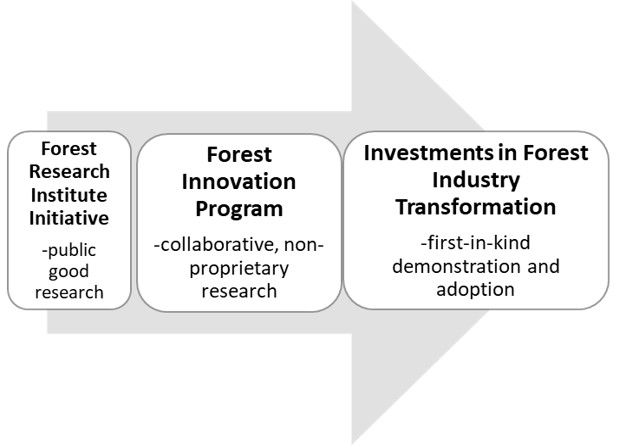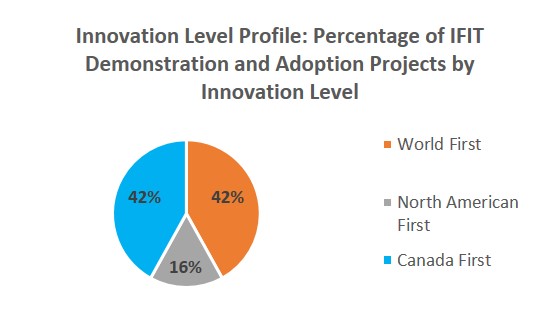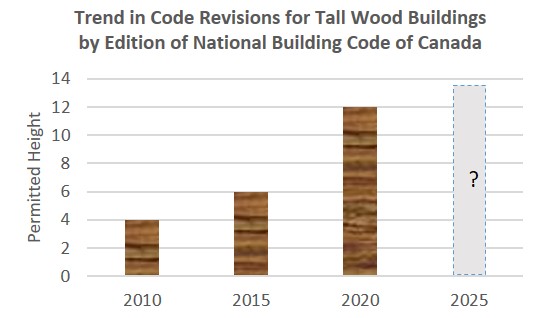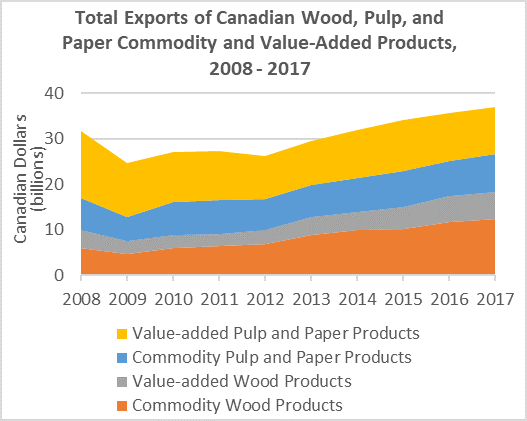Summary of the Evaluation of Natural Resources Canada's Forest Sector Innovation (FSI) Programs
About the Program
- The Forest Sector Innovation (FSI) programs consist of the Investments in Forest Industry Transformation (IFIT) program; the Forest Research Institute Initiative (FRII), and the Forest Innovation Program (FIP). The Transformative Technologies (TT) program is the core component of FIP.
- Collectively, the programs are designed to invest in innovative research, development, and demonstration, as well as commercial pilots and knowledge transfer that will support the forest sector’s transformation to producing higher-value forest products. FPInnovations delivers two of these programs: the TT and FRII programs.
- Actual expenditures over the period of evaluation were $271 million (M). IFIT and the TT program had the highest expenditures with $118M and $121M respectively.

Text version
Description: A simplified description of the Forest Sector Innovation (FSI) programs. The Forest Research Institute Initiative engages in public good research. The Forest Innovation Program engages in collaborative, non-proprietary research. Investments in Forest Industry Transformation engages in first-in-kind demonstration and adoption.
Relevance
The programs continue to be relevant and well aligned with NRCan roles, responsibilities, and priorities. However, the Canadian Forest Service needs to strengthen its role with respect to the Transformative Technologies program to ensure that there is a sufficient emphasis on transformative activities to support the transition to the bioeconomy.

Text version
Description: IFIT Project Profile. Pie chart showing the distribution of the 31 IFIT-supported projects by innovation level profile and product profile. In terms of the project’s technology innovation level, of the 31 IFIT projects, 42% were world firsts for the supported technology, 42% were the first of their kind in Canada, and 16% were the first of their kind in North America.
Effectiveness
The FSI programs have made progress in terms of developing and advancing innovations, providing evidence for codes, standards, policy development, and decision-making related to forest management and sustainable development. Transitioning to a bioeconomy will require further Canadian Forest Service efforts to strengthen collaborations with a broad range of stakeholders.
Pre-commercialization innovation gaps, such as the need for more advanced research and for more market development support for novel bioproducts, are impeding adoption of novel forest products.

Text version
Description: Graph of the trend in height of tall wood buildings (in storeys) permitted in code revisions by edition of the National Building Code of Canada, 2010 to 2025.
| Year | 2010 | 2015 | 2020 | 2025 |
|---|---|---|---|---|
| Permitted Height in Number of Storeys | 4 | 6 | 12 | To be determined |
Efficiency
Evaluation evidence suggests that several aspects of the program design and delivery, contribute to the efficient production of its services, products and results. However, there is a need to improve monitoring and reporting of program deliverables and outcomes, and to improve the design of the IFIT program to enhance its flexibility, to facilitate optimal project selection, and to encourage high-risk projects.

Text version
Description: Total Exports of Canadian Wood, Pulp, and Paper Commodity and Value-Added Products (billions of dollars), 2008 – 2017. A line graph showing the value (in billions of dollars) of Canadian exports of value-added pulp and paper products, commodity pulp and paper products, value-added wood products, and commodity wood products by year from 2008 to 2017.
Source: ISED Trade Data Online, Harmonized Commodity Description and Coding System.
* Note: Includes newsprint as a value-added pulp and paper product
| Product | 2008 | 2009 | 2010 | 2011 | 2012 | 2013 | 2014 | 2015 | 2016 | 2017 |
|---|---|---|---|---|---|---|---|---|---|---|
| Value-added Pulp and Paper Products | $14.6 | $11.9 | $11.0 | $10.8 | $9.5 | $9.7 | $10.6 | $11.1 | $10.7 | $10.4 |
| Commodity Pulp and Paper Products | $7.2 | $5.2 | $7.3 | $7.5 | $6.8 | $7.0 | $7.5 | $8.0 | $7.6 | $8.3 |
| Value-added Wood Products | $3.8 | $2.8 | $2.8 | $2.6 | $3.1 | $3.8 | $4.0 | $4.9 | $5.7 | $6.0 |
| Commodity Wood Products | $6.1 | $4.6 | $5.9 | $6.4 | $7.0 | $8.9 | $9.9 | $10.1 | $11.8 | $12.3 |
| * Note: Includes newsprint as a value-added pulp and paper product | ||||||||||
About the Evaluation
The evaluation covers the period from 2013-14 up to January 2019. The purpose of the evaluation was to assess the programs’ relevance and performance. This evaluation is consistent with the requirement of the Treasury Board Policy on Results (2016). Details on specific evaluation questions, methods and limitations are found in the full report.
Recommendations and Management Response and Action Plan
1. The Canadian Forest Service should play a stronger role to ensure that the Transformative Technologies program has an optimal balance of transformative and incremental innovation activities to support the transition to the bioeconomy.
Agreed. As part of FPInnovations redesign of their research strategy, the Canadian Forest Service (CFS) will actively participate and influence the planning process of their work plan to ensure there is emphasis on transformative innovation activities in support of the CCFM Forest Bioeconomy Framework. The evolution of the new TT program will target both transformative and incremental innovation activities. (more details provided in Recommendation #2).
Target Date: March, 2020
2. The Canadian Forest Service should work with its partners to further broaden the programs’ reach and increase collaboration with SMEs, academia, and other sectors. The Canadian Forest Service should consider and implement novel approaches for pilot projects to increase collaboration and knowledge transfer between industry, FPInnovations, and academia.
Agreed. The CFS will work with partners to increase its collaboration with SMEs, academia and other sectors. The IFIT program will use the small enterprises stream to target SMEs through more aggressive outreach activities for upcoming calls for proposals. Small enterprises follow a streamlined application and due diligence process as outlined in the IFIT guidance document on how to submit a proposal.
The CFS will also work to improve direct funding opportunities, collaboration and knowledge transfer with academia, national organizations, SME’s and other industrial sectors through the launch of competitive pilot project platform collaborations with FPInnovations, industry and academia. In particular, CWFC will widen its reach, by working more closely with FPInnovations on national collaborative projects to increase the development and deployment of scientific tools and products to the forest industry and provinces. Target Date: March, 2020
3. The Canadian Forest Service should work with partners to advance projects that will address pre-commercialization innovation gaps.
Agreed. The CFS will work with partners to address pre-commercialization innovation gaps where no current funding is available. This will be accomplished through market research studies for novel products and bioproduct applications R&D needed to bring biomaterials to market.
The IFIT program’s Feasibility Studies project category will be expanded to include different types of assessments needed to bridge gaps in the innovation spectrum. This component will now be called Complementary Studies. Examples of eligible projects include feasibility studies for innovation technologies or trials for market acceptance of new bioproducts. Target Date: March, 2020
4. The Canadian Forest Service should improve its performance measurement and reporting of its programs and projects:
- Identify and implement valid metrics, targets and methods for measuring key outcomes of innovation programs (e.g. technology advancement, value and use of knowledge products and decision-support tools).
- Reports should clearly, accurately and consistently report on the status of milestones and progress at the project and program levels.
Agreed. CFS has developed a solid approach by following a methodology for effective performance reporting according to the Performance Information Profile (PIP) for the Fibre Solutions and the Forest Sector Competitiveness programs.
In addition, work is underway to strengthen and streamline the performance measurement system and performance metrics, including GBA+ considerations, as part of the renewal efforts of Budget 2019. CFS will assess the feasibility of using a CRM tool which would be planned to be available by summer 2020. Target Date: March 2020 for new methodology, ongoing for implementation through to March 2023
5. The Canadian Forest Service should work with the Treasury Board Secretariat to enhance elements of IFIT’s design and delivery. These changes would facilitate optimal project selection, encourage high-risk projects, and improve the management of complex innovation projects:
- Consider new, more flexible models of funding intake;
- Identify strategies to enhance funding flexibility that will better allow carry-over of funds from one fiscal year to the next; and
- Identify novel strategies to encourage high-risk projects.
Agreed. As part of the Budget 2019 program renewal, IFIT will be exploring ways to increase flexibility for its applicants and recipients:
- The program will identify flexible proposal intake options that strike a balance between a single call for proposals process and a continuous intake process and that can be practically applied given the three-year funding period and the average completion time of a IFIT project (18-24 months).
- CFS will engage with TBS on experimentation measures that may allow for more funding flexibility between fiscal years. The program will review options that align with the Transfer Payment policy.
IFIT program objectives include the derisking of innovation and as result, the program inherently encourages proposals for high risk projects. A streamlined risk assessment process for small enterprises is also in place. - The program will implement novel strategies, for example, putting in place a formal process to encourage complementary studies or product trials for promising technologies, process, or bioproducts. Furthermore, IFIT will encourage solutions to industry challenges through its new Targeted Measures project category. (ADM, CFS), Target Date: March 2020 to confirm outcome of engagement with Treasury Board Secretariat and program renewal. October 2020 to commence implementation of flexibility measures.
Page details
- Date modified: